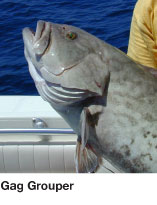 |
||||||||
 |
IFQ’S—AOK OR SNAFU’s?
 Fishery managers struggle with allocation of reef fish
Fishery managers struggle with allocation of reef fish
By Frank Sargeant
Federal fishery managers generally agree that reef fishes, particularly red snapper, gag and red grouper, are being overharvested in the Gulf of Mexico. That is, they are being removed from the gulf faster than the population can replenish itself. Some five million pounds of red snapper are hauled in during a typical year, for example, with about half winding up in restaurants, the rest on kitchen tables.
Individual fishing quotas or IFQ’s are a recent effort by the Gulf of Mexico Fishery Management Council to equitably control the harvest of popular reef fishes—a red snapper IFQ went into effect last year, and red and gag grouper IFQ’s are likely in 2009. Basically, under an IFQ system, the individual users in the fishery are assigned an annual quota, and they are allowed to take that quota, in pounds of legal-sized fish, at any time during the fishing season.
For commercial harvesters, the major advantage is the reduction of the “gold-rush” effect when a fishery first opens, in which each captain tries to capture as much of the allowable annual quota in the shortest possible time. The result, which has become the standard under modern fishery rules, is sometimes a glut on the market as dozens of boats return with massive catches at nearly the same time. The temporary abundance of product allows seafood houses to cut prices, and the boat owners make far less than they would if they could bring in their catch in a more measured way.
Federal fishery managers who support IFQ’s also say that there’s less incentive for boat owners to push crews into fishing during dangerous conditions, and that fishing can be more efficient, since fishers can concentrate their efforts during times when the bite is most active.
IFQ’s have been used for years, reportedly with good success in the highly-developed Bering Sea fisheries of Alaska as well as elsewhere, and commercial fishing interests on the Gulf of Mexico generally support them. Nearly 1,000 boats are eligible for IFQ’s, according to the Gulf Council.
Recreational fishing groups and some conservation organizations, on the other hand, have been less enamoured of the concept, which they say deeds away a public resource without compensation. The IFQ’s are awarded based on the number of commercial fishermen who can show they were active participants in the fishery with their portion of the total allowable catch (TAC) then divided equally. Fishermen can then buy and sell these shares. Typically, commercial interests get about half of the TAC, recreational fishers the rest.
An added issue at present is that some charter boat captains have been calling for the recreational quota to be split equally among private anglers and those who fish on charter boats. Most recreational fishermen don’t like this idea at all, because it has the potential to further shorten their seasons or reduce bag limits, which have already been greatly reduced in the last decade.
“Recreational fishermen can only fish weekends, not every day like the charter fishermen can,” says Bill Coursen, chairman of the Pensacola Recreational Fishermen’s Association. “If the charter industry wants to be removed from the recreational sector, let them share the commercial sector quota, because they are commercial fishermen who put pressure on the fishery and make money from it. Otherwise, the 2.7 million anglers in the recreational sector will be stuck with only about 24% of the total allowable catch, while a small number of charterboaters share larger amounts.”
Vance Tice, owner of one of the largest tackle shops in the Tampa Bay area, agrees. “With the economic slump for the last several years, fuel prices and bad weather, recreational pressure on reef species is not a quarter of what it was 10 years ago,” says Tice. “We see it every day in the reduction in bottom-fishing gear sales.”
In any case, it appears that IFQ’s are likely to be an integral part of fishery management in Florida for the foreseeable future. If they successfully limit the harvest and restore fishery populations, they will have done their job—it will then be up to commercial and recreational fishers and fishery managers to haggle over splitting up the newly abundant resource.
Frank Sargeant is the “semi-retired” outdoors editor of the Tampa Tribune, a post he held for more than 24 years. He’s also founder of the Frank Sargeant Outdoors Expo and author of a dozen books on the outdoors, as well as a senior writer for Outdoor World Television and Editor at Large for Florida Sportsman Magazine. He recently moved from his long-time home on the Little Manatee River in Ruskin to Smith Lake in rural Alabama.